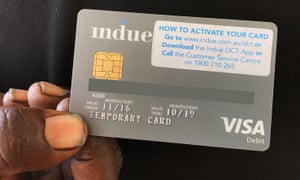Jack Dempsey says his Queensland community opposes $10,000-per-person cost of trial and says money is better spent elsewhere
The mayor of Bundaberg, former LNP stalwart and Queensland state
minister Jack Dempsey, says his community has turned against a cashless
welfare trial after learning the cost.
The Wide Bay-Burnett region of Queensland is among Australia’s most disadvantaged. Dempsey said across the Bundaberg and Fraser Coast council areas, 22% of ratepayers were on some form of pension or welfare.
In February, the Senate blocked the government’s attempts to expand a cashless debit card program for welfare recipients to the Hinkler federal electorate, which stretches from roughly Hervey Bay to Bundaberg.
The trial has the strong backing of the Hinkler federal LNP member, Keith Pitt, and the government is expected to try again in parliament soon.
Pitt has cited polling that shows 75% of locals supported cashless welfare.
Bundaberg council undertook its own survey that showed 56% support.
But when locals were told how much the trial program would cost to
administer – according to the Australian council of social services about $10,000 a year per participant– support drops to just 26%.
Dempsey said his community wanted jobs, a common theme in regional and particularly central Queensland, where unemployment rates are consistently high.
“Surely there’s ways to incentivise people,” Dempsey said. “When you look at $10,000 ... per individual, it suddenly stacks up that you could nearly pay for them to have a job in the first place.”
Dempsey was police minister in the Newman Queensland government but is no longer a member of the LNP. He said people wanted jobs, not welfare programs. And that for all the government was spending on cashless welfare, it would be better to invest in economic development programs that would help put people to work.
“You’ve got to have jobs before welfare. You could nearly give that to employers to get people in to jobs. You are almost penalising people out of poverty.
“Whoever thought this up in the party room in the 12 months lead-up to an election deserves an uppercut.”
Dempsey said the council was also seeking clarity about how the trial would work. Because Bundaberg is near the boundary of the neighbouring Flynn federal electorate, a trial in Hinkler would split the regional council area along either side of the Burnett River. Fraser Coast would have a similar problem, with different welfare systems in Maryborough and Hervey Bay.
Infrastructure spending and tax incentives were ways to encourage people to live in the regions and create jobs, Dempsey said. He called for the government to trial tax concessions for companies and businesses to base themselves in the regions.
“There are cities around the whole of Australia they’ve got infrastructure demands on them, the quality of life is going down – the average person is spending two hours in a car going backwards and forwards.
“We need to incentivise business to go into the regions. Otherwise we’re just pushing more and more people into the city.”
“Now we see all of these state and federal electorates all around where our major capitals are, and we see the regional ones dwindling. The political mass is in the cities and politics is all about numbers.”
The Wide Bay-Burnett region of Queensland is among Australia’s most disadvantaged. Dempsey said across the Bundaberg and Fraser Coast council areas, 22% of ratepayers were on some form of pension or welfare.
In February, the Senate blocked the government’s attempts to expand a cashless debit card program for welfare recipients to the Hinkler federal electorate, which stretches from roughly Hervey Bay to Bundaberg.
The trial has the strong backing of the Hinkler federal LNP member, Keith Pitt, and the government is expected to try again in parliament soon.
Pitt has cited polling that shows 75% of locals supported cashless welfare.
Dempsey said his community wanted jobs, a common theme in regional and particularly central Queensland, where unemployment rates are consistently high.
“Surely there’s ways to incentivise people,” Dempsey said. “When you look at $10,000 ... per individual, it suddenly stacks up that you could nearly pay for them to have a job in the first place.”
Dempsey was police minister in the Newman Queensland government but is no longer a member of the LNP. He said people wanted jobs, not welfare programs. And that for all the government was spending on cashless welfare, it would be better to invest in economic development programs that would help put people to work.
“You’ve got to have jobs before welfare. You could nearly give that to employers to get people in to jobs. You are almost penalising people out of poverty.
“Whoever thought this up in the party room in the 12 months lead-up to an election deserves an uppercut.”
Dempsey said the council was also seeking clarity about how the trial would work. Because Bundaberg is near the boundary of the neighbouring Flynn federal electorate, a trial in Hinkler would split the regional council area along either side of the Burnett River. Fraser Coast would have a similar problem, with different welfare systems in Maryborough and Hervey Bay.
Infrastructure spending and tax incentives were ways to encourage people to live in the regions and create jobs, Dempsey said. He called for the government to trial tax concessions for companies and businesses to base themselves in the regions.
“There are cities around the whole of Australia they’ve got infrastructure demands on them, the quality of life is going down – the average person is spending two hours in a car going backwards and forwards.
“We need to incentivise business to go into the regions. Otherwise we’re just pushing more and more people into the city.”
“Now we see all of these state and federal electorates all around where our major capitals are, and we see the regional ones dwindling. The political mass is in the cities and politics is all about numbers.”

No comments:
Post a Comment